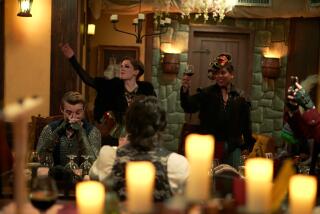Fire at lesbian bar Gossip Grill was quickly cleaned up, but patrons’ sense of safety was scorched
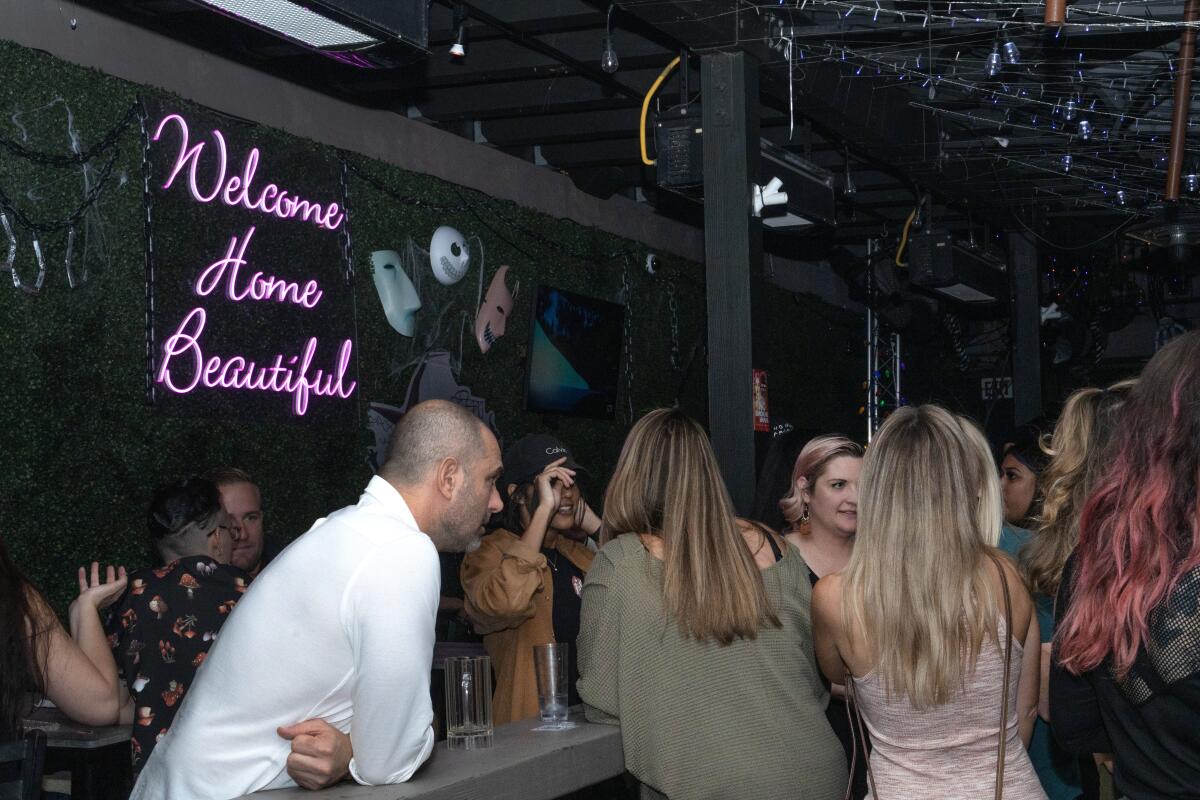
- Share via
Freda Horton woke up on a Friday morning to a barrage of frantic texts from friends and family. “Are you OK?” they asked. There had been a fire reported at Gossip Grill the previous night just half an hour after Horton’s shift ended. She works as a bartender at the beloved lesbian bar in San Diego.
Firefighters on the scene of the Oct. 20 blaze, which started in the outside patio, were able to knock it down before the flames reached the rest of the establishment — but not before an estimated $7,000 in damages had been done. News of the suspected arson at the bar spread quickly in Hillcrest, a prominent LGBTQ+ neighborhood in San Diego.
Patrons and fans rallied, focused on restoring this haven for the queer community to its old self. But despite the superficial nature of the fire and the relative ease it took for the bar to recover financially, the fear it caused among some patrons was not so easily quelled.
Those who spoke with The Times in the aftermath of the fire said that, in a world where violence against queer people has become all too commonplace, safe spaces are crucial to the community. For some, the incident at Gossip Grill, one of Southern California’s few lesbian bars, shook their sense of safety.
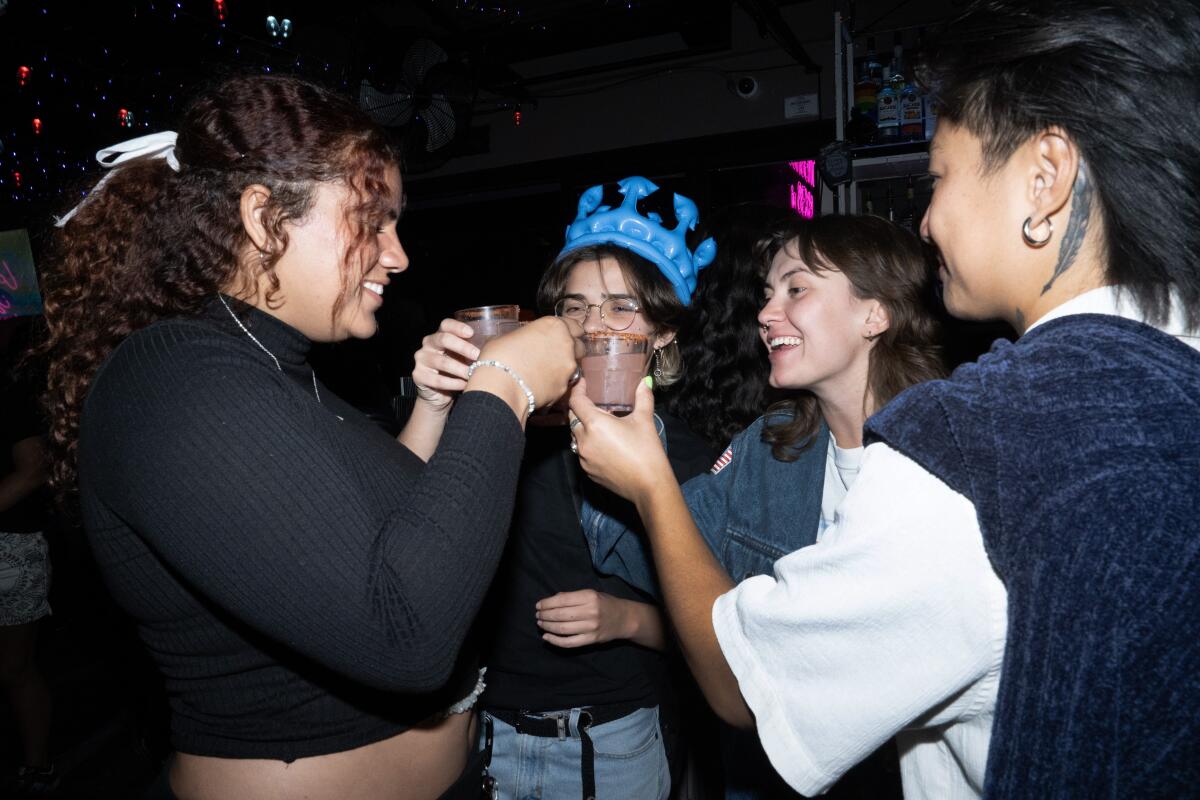
The morning after the fire, Horton said volunteers wielding work tools rallied to overhaul the damages, and even a tattoo artist donated proceeds from their work to help them recoup losses. The following week, they were back to business as usual, if not even more busy, Horton said, as patrons flooded the establishment and bought drinks to help raise money for repairs.
“We’re already taken care of it. You got a group of lesbians and a Home Depot card — come on now,” Horton said with a laugh.
There was no evidence that the arson was a result of a hate crime. San Diego police arrested Ryan Habrel, 38, on suspicion of two counts of arson with the special allegation that he used a device to accelerate the spread of the fire. Habrel has pleaded not guilty to the charges and remains in custody at a San Diego County jail in lieu of $150,000 bail. He has also been ordered by a judge to stay away from Gossip Grill as well as other local restaurants owned by the same conglomerate, Mo’s Universe Restaurant Group, including Hillcrest Brewing Co., Urban MO’s, insideOUT, Baja Betty’s and Barrel & Board.
Habrel’s next court appearance is set for Dec. 18, according to online jail records. The Times was unable to reach a legal representative for Habrel, and the San Diego County district attorney’s office declined to comment as the case is ongoing.
Although the arson was fresh in patrons’ memory, just two weekends later, the bar was buoyant. Leftover Halloween decorations hung overhead as people rocked and swayed on the Gossip Grill dance floor to a range of music genres, from Afrobeats to disco.
Gossip Grill is just a skate ride down the block for Hillcrest resident Melanie Quijano. She’s been a regular at the bar for the last five years and on a recent weekend was celebrating a reunion and a birthday among her friends. She said the Hillcrest community has always been welcoming to its queer residents.
Although the fire was upsetting, she was upbeat: “S— just happens. Gossip opened up the next day, completely fine.”
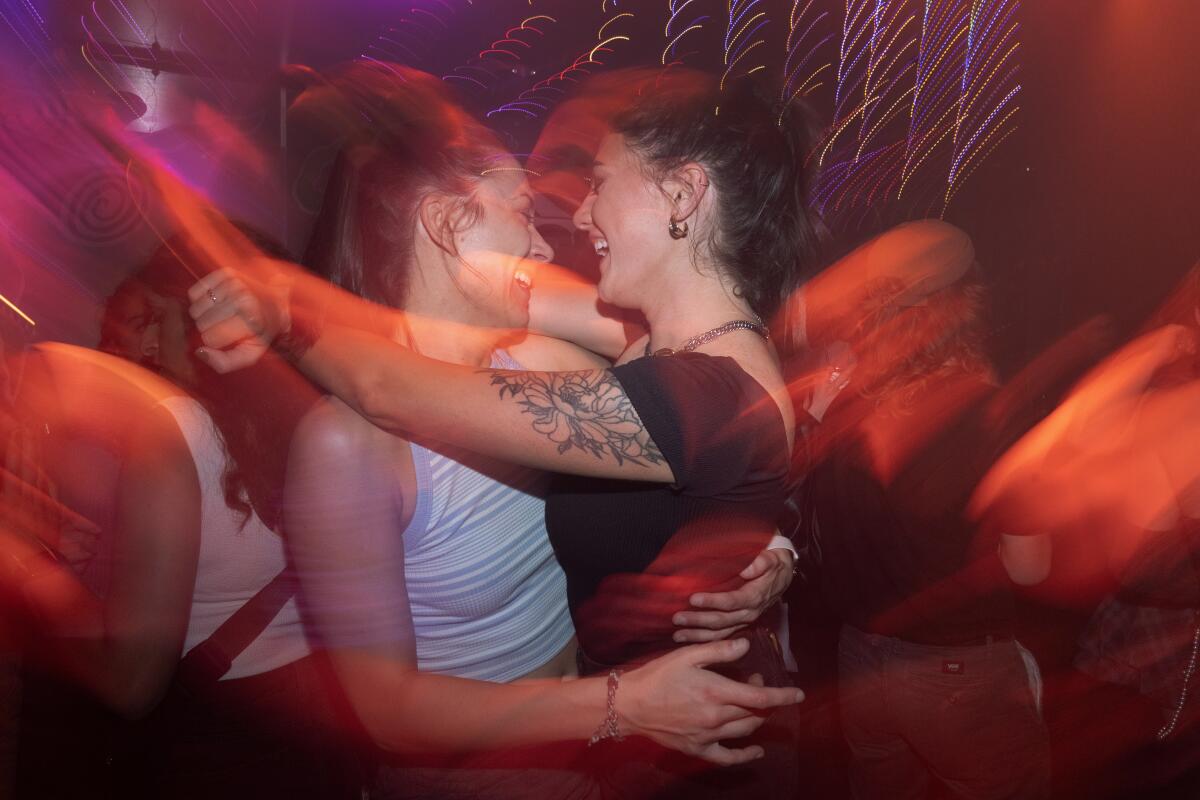
Others felt the incident shouldn’t be quickly dismissed, hate crime or not. Kristin Brill was in San Diego over the weekend to attend a Doja Cat concert with friends, but she had seen the news of the fire on social media. Where Brill lives in Montana, there aren’t many queer bars, which make her yearly visits to Gossip Grill even more sacrosanct. The 27-year-old said the fire, regardless of the motive behind it, dredged up the hostility to the community that’s been documented in the news.
She said attacks like the shooting in Florida’s Pulse Nightclub had normalized violence against queer people. “There’s amped-up racism and homophobia everywhere,” Brill said. “There’s tons of anti-trans laws being passed.”
That hate toward LGBTQ+ people is what drives them to seek safe spaces like Gossip Grill. Camille K. (who declined to provide their full last name because of their active military service) recently moved to San Diego for work and was elated to be surrounded by others in the queer community. Growing up in the Midwest, they noted the high suicide rates among queer youth and said loneliness and a lack of representation could be at their root.
“You can go online. You can see people that identify as who you are,” K added. But that online support cannot rival the euphoria of being physically surrounded by affirming representation. “Coming into this space, it’s a whole new realm.”
And it’s not just the lesbians who find their welcome home at Gossip Grill. Hillcrest, as a gayborhood, is home to a number of queer bars lining University Avenue. Anthony Patton, a local social worker who’s lived in San Diego for three years, said Gossip Grill ranks as his favorite local bar for its authentic and warm atmosphere.
“Unlike other bars in the Hillcrest area, I made connections just off the cuff — it’s been genuine. I feel able to be free and express myself and dance and be accepted,” Patton said. Sometimes in other gay bars, he notices that people move in cliques or can be judgmental before deciding to strike up a friendly conversation. “Being a gay Black male, oddly enough, Gossip Grill is the place where I feel the most at home.”
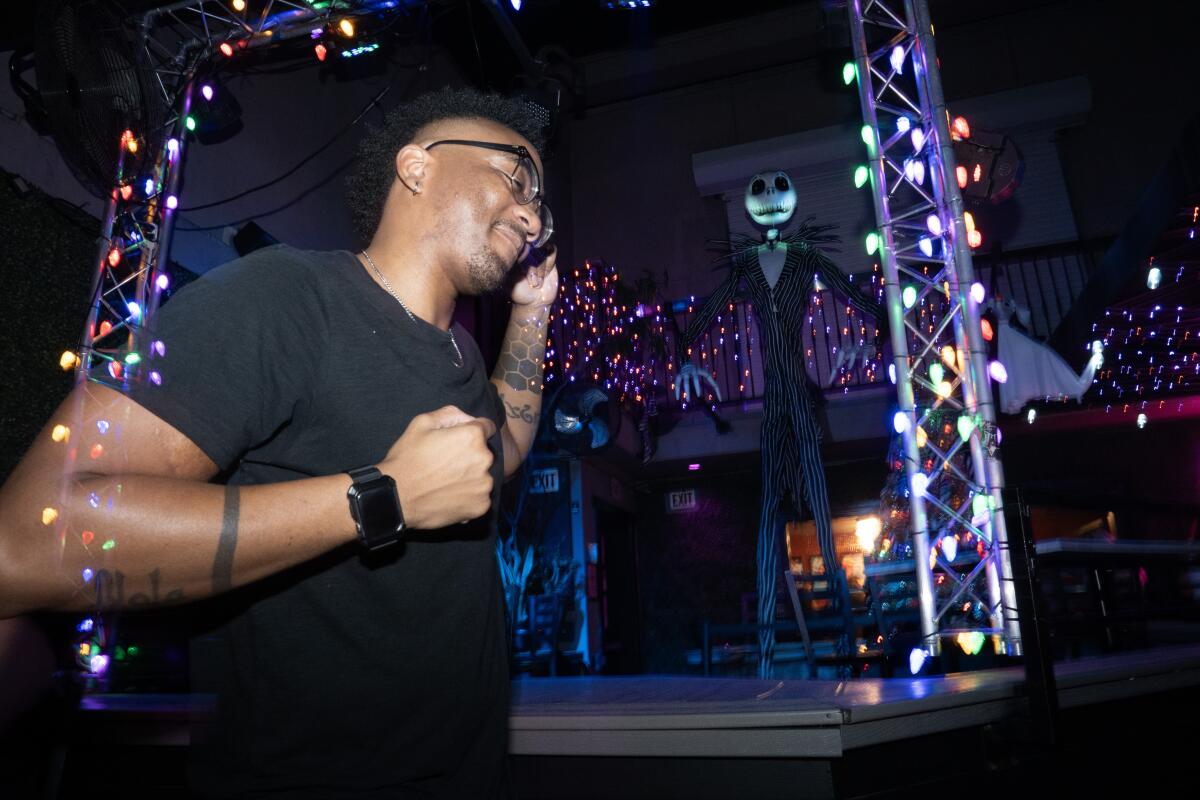
On the wall of Gossip Grill’s outdoor patio, a neon pink sign, “Welcome Home Beautiful,” greets people as they walk into the bar. “[That’s] our whole motto,” said Horton of their bar’s values. “We want to be your home away from home.”
Like Horton, bartender Justin Nelson has worked at Gossip Grill since it opened 14 years ago — he’s affectionately known as the “lesbro” of the team. Horton remembers seeing the bar outgrow its first location, also in Hillcrest, within six months of opening. “We literally had our little dance floor in front of the bathrooms with a DJ sitting in a windowsill,” Horton said. The bar opened at its present location in 2009.
During the pandemic, the bar survived when many others shut down by finding unique ways to get people to support the business. They sold alcohol by the bottle as well as home-delivered food. “I literally dressed up in a blow-up unicorn outfit and hand-delivered food to our guests.”
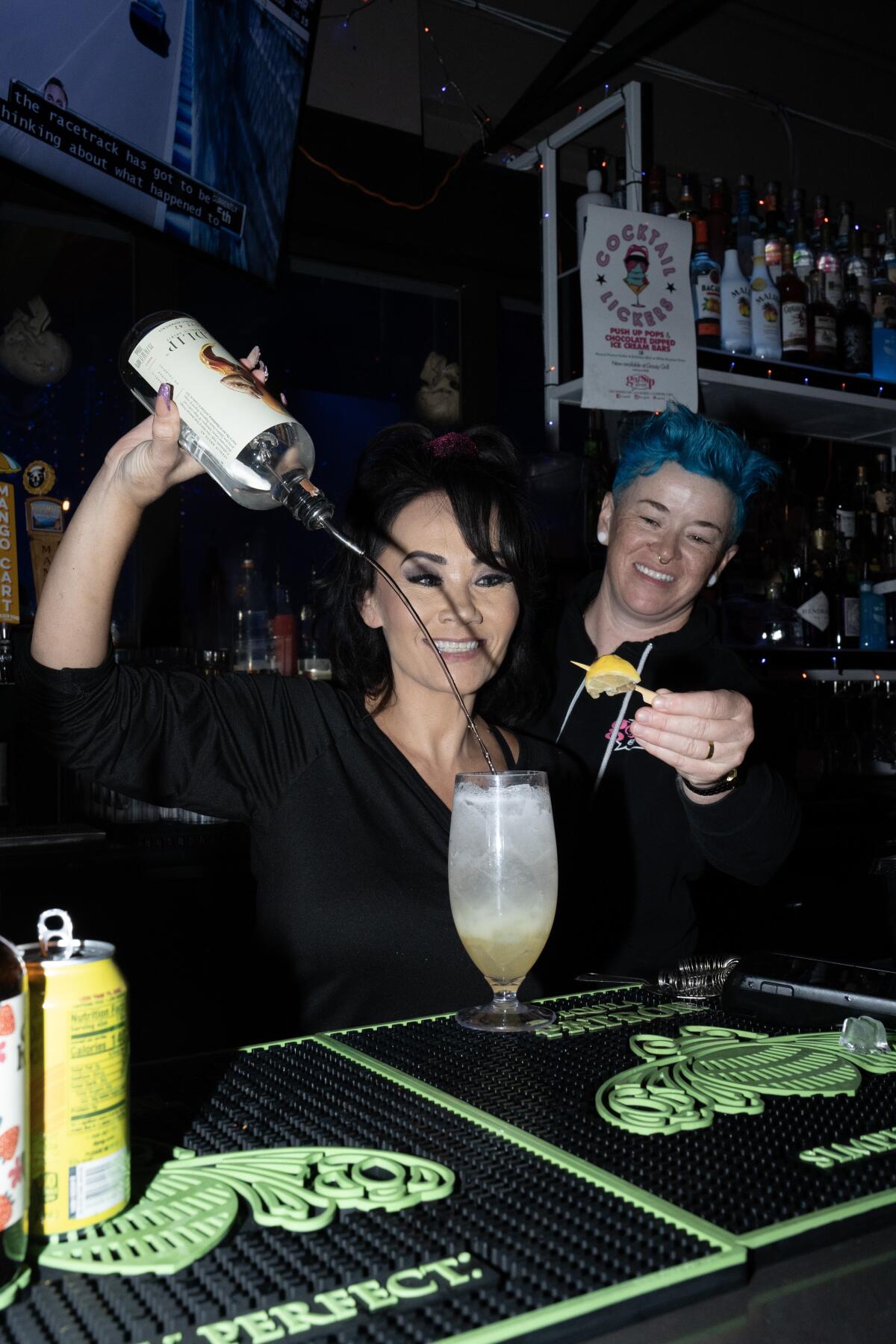
But what’s stayed true for Horton and for Gossip Grill over the years is a commitment to making room for everyone — whether that’s meant raising awareness for the Black Lives Matter movement or welcoming trans women in the community. That spirit is at the foundation of the establishment. Nurturing the community around their bar has been one of Horton’s greatest joys.
“You get to watch the baby gays grow up and become an incredible powerful part of our community,” Horton said. “And that’s been an honor for us because they come in at 21 and they’re still coming in now in their mid to late 30s.”
Times staff writer Jeremy Childs contributed to this report.
More to Read
Sign up for Essential California
The most important California stories and recommendations in your inbox every morning.
You may occasionally receive promotional content from the Los Angeles Times.


